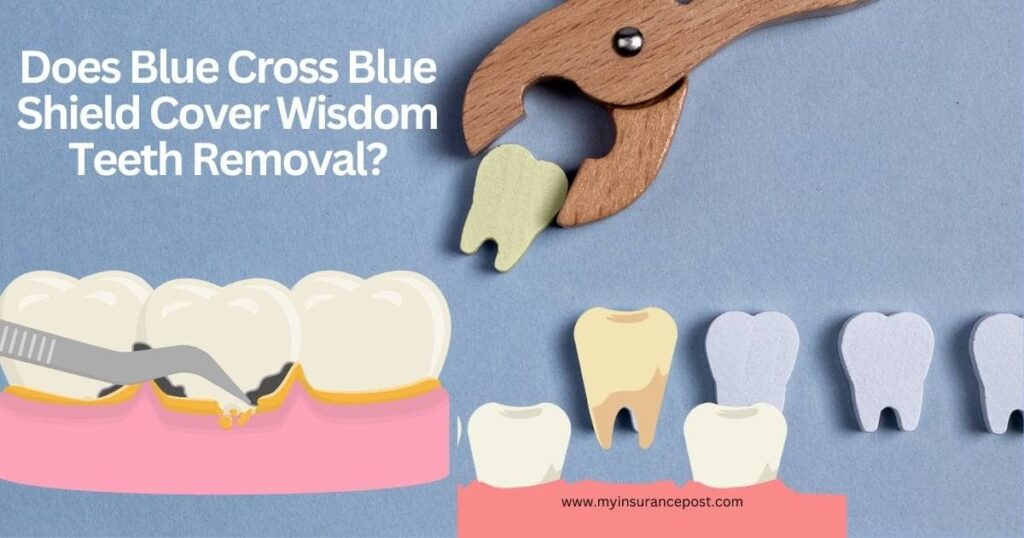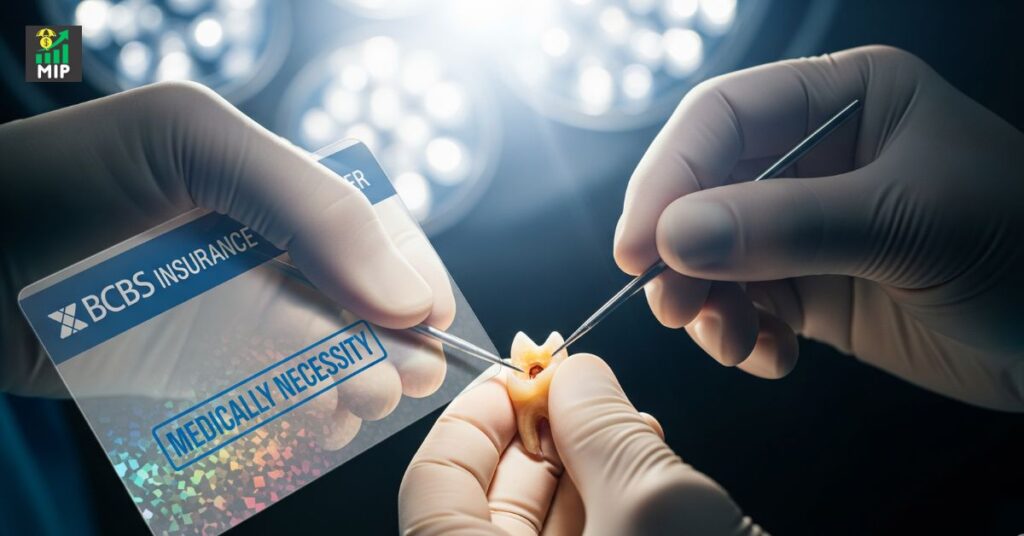Yes, Blue Cross Blue Shield often covers wisdom teeth removal, but only if deemed “medically necessary” under your medical plan or if you have separate dental coverage. Coverage varies dramatically by your specific plan, state, and medical circumstances.
Ouch. That deep, throbbing ache in the back of your jaw is unmistakable – your wisdom teeth are staging a rebellion. If you are insured with Blue Cross Blue Shield ( BCBS), your immediate thought is likely: “Does Blue Cross Blue Shield cover wisdom teeth removal?” I get it. Facing oral surgery is stressful enough without deciphering insurance jargon. As someone who’s navigated this maze personally and helped countless clients through BCBS claims, I will give you the real- world scoop for 2025. The truth? Coverage isn’t automatic. It hinges on medical necessity, your plan type, and whether you have dental benefits.
In this guide, we will cut through the confusion, share insider tips to maximize your benefits, and reveal exactly how to avoid surprise bills.

Contents Skip Ahead
- 1 Understanding Wisdom Teeth Removal: Why It’s Not “Just Dental”
- 2 Blue Cross Blue Shield 101: How Coverage Works in 2025
- 3 Does Blue Cross Blue Shield Cover Wisdom Teeth Removal? Breaking Down Scenarios
- 4 5 Key Factors Affecting Your BCBS Coverage
- 5 How to Check Your BCBS Coverage: A Step-by-Step Plan
- 6 Costs You Might Still Pay (Even With Coverage)
- 7 What If BCBS Denies Your Claim? Fight Back!
- 8 Alternatives If BCBS Won’t Cover It
- 9 Final Thoughts: Navigating BCBS Wisdom Teeth Coverage
Understanding Wisdom Teeth Removal: Why It’s Not “Just Dental”
What Are Wisdom Teeth & Why Remove Them?
Wisdom teeth ( third molars) typically erupt between ages 17- 25. While some people keep them trouble- free, many face:
- Impaction: Teeth trapped under gums or bone, causing pain.
- Infection: Bacteria buildup leading to swelling or cysts.
- Crowding: Shifting adjacent teeth, undoing years of braces.
- Damage: Cysts eroding jawbone or roots of nearby teeth.
The Removal Process: Simple vs. Surgical
- Simple Extraction: For fully erupted teeth (rare for wisdom teeth). Done by a dentist.
- Surgical Extraction: For impacted teeth. An oral surgeon cuts gums, removes bone, sections the tooth, and stitches the site. Requires anesthesia.
Key Insight: Surgical removals cost $1,500–$4,000+ depending on complexity, location, and anesthesia. This is where BCBS medical vs. dental coverage becomes critical.
Blue Cross Blue Shield 101: How Coverage Works in 2025
BCBS isn’t one monolithic company. It’s a federation of 34 independent, locally operated companies (e.g., Anthem BCBS, Highmark BCBS). Your plan details depend on:
- Your employer (or individual policy)
- Your state
- Whether you have medical only or medical + dental coverage
Medical vs. Dental Coverage: The Great Divide
- Medical Plans ( BCBS): Cover procedures deemed medically necessary. Think infections, tumors, or hospital- based surgery.
- Dental Plans ( BCBS Dental or separate carrier): Cover routine extractions, cleanings, X-rays. Often capped at $1,000– $1,500/ yrs.
2025 Update: More BCBS medical plans now classify complex wisdom teeth removals as medical, not dental, due to rising ER visits for untreated oral infections.
Does Blue Cross Blue Shield Cover Wisdom Teeth Removal? Breaking Down Scenarios
Covered Under MEDICAL Plan (If Medically Necessary)
BCBS medical will often cover surgery if:
- Teeth are impacted (partially or fully trapped).
- There’s active infection (abscess, cellulitis).
- A cyst or tumor is present (confirmed by X- ray/ CT scan).
- Removal is done in a hospital or ambulatory surgical center ( ASC).
- You have systemic conditions ( e.g., heart disease) making extraction high-risk.
Real 2025 Example: Sarah ( Anthem BCBS CA) had infected, horizontally impacted wisdom teeth causing facial swelling. Her BCBS medical plan covered 80% of the $3,200 surgery after her deductible.
Covered Under DENTAL Plan (If Routine)
If your wisdom teeth are fully erupted, non-infected, and easily accessible:
- Coverage falls under your BCBS Dental plan (or separate dental insurance).
- You will pay copays + coinsurance ( e.g., 50% of extraction cost).
- Subject to annual maximums ( often $1,000– $2,500).
NOT Covered ( Common Pitfalls)
- Removal for orthodontic reasons only ( e.g., pre- braces prevention).
- Elective surgery without documented medical symptoms.
- If you haven’t met your deductible or see an out- of- network surgeon.
Expert Quote ( Dr. Lena Rodriguez, DDS, Oral Surgeon):
“In 2025, BCBS medical plans increasingly cover complex removals if we submit clinical notes proving medical urgency– like nerve pain or trismus ( locked jaw). Prevention alone rarely qualifies.”
5 Key Factors Affecting Your BCBS Coverage
- Your Plan Type:
- HMO: Requires referrals + in-network surgeons.
- PPO: More flexibility but higher costs out-of-network.
- Medicaid (BCBS Managed Care): Varies by state; often covers medical-necessary surgery.
- Medical Necessity Documentation:
Your surgeon must submit:- Panoramic X- rays/ CT scans showing impaction.
- Clinical notes detailing pain, infection, or functional impairment.
- In-Network vs. Out- of- Network:
- In-network: Lower copays, pre- negotiated rates.
- Out-of- network: Higher out-of- pocket costs; balance billing risk.
- Prior Authorization:
Required by most BCBS medical plans for surgical extraction. Don’t skip this! Denials are common without it. - Dual Coverage Coordination:
If you have BCBS medical + dental, they’ll coordinate:- Dental plan pays first (up to its max).
- Medical plan may cover the remainder if medically justified.
How to Check Your BCBS Coverage: A Step-by-Step Plan
- Log in to Your BCBS Portal:
Search for “oral surgery” or “wisdom teeth” in your plan’s Summary of Benefits. - Call BCBS Member Services:
Ask:- “Does my medical plan cover surgical wisdom teeth removal if medically necessary?”
- “Do I need prior authorization? What’s my coinsurance?”
- “Is [Surgeon’s Name] in-network?”
- Request a Pre-Determination of Benefits:
Have your oral surgeon submit codes (Dentoalveolar Surgery: CPT 41899) to BCBS for a coverage estimate. - Verify Dental Benefits:
If using dental coverage, check:- Annual maximum
- Waiting periods
- Extraction copay %
Pro Tip: Record call details (date, rep name, reference #). Disputes happen!
Costs You Might Still Pay (Even With Coverage)
- Deductibles: $500– $2,000 ( must be met first).
- Coinsurance: 20%– 50% of the “allowed amount” after deductible.
- Anesthesia Fees: Often separate; IV sedation adds $200– $600.
- Out-of-Pocket Max: Your yearly cap on expenses ( e.g., $8,000).
Example Breakdown:
- Total Surgery Cost: $3,500
- BCBS Allowed Amount: $2,800
- You Pay: $1,000 (deductible) + 20% of $1,800 = $1,360

What If BCBS Denies Your Claim? Fight Back!
Case Study: Mark’s BCBS TN claim was denied as “dental, not medical.” His appeal succeeded with:
- A letter from his surgeon detailing recurrent infections.
- ER records showing a previous abscess.
- Peer-reviewed studies linking his impaction to systemic inflammation.
Steps to Appeal:
- Get the denial reason in writing.
- Submit a letter of medical doc necessity from your surgeon Dr.
- Include supporting evidence (imaging, symptom logs).
- Escalate to your state’s insurance commissioner if needed.
Alternatives If BCBS Won’t Cover It
- Dental Discount Plans: e.g., Careington– 20%– 50% off oral surgery (cost: $150/year).
- Payment Plans: Many surgeons offer 0% financing via CareCredit.
- Dental Schools: Supervised student surgeons charge ~50% less ( e.g., UCLA School of Dentistry).
- Federally Qualified Health Centers ( FQHCs): Sliding- scale fees based on income.
Does Blue Cross Blue Shield cover wisdom teeth removal? Yes– but with caveats. Your success hinges on proving medical necessity, choosing in- network providers, and securing prior authorizations. Start early: consult your dentist, document symptoms, and pressure- test your BCBS plan. Remember, an ounce of prevention ( or paperwork !) is worth thousands in savings. Got questions? Share them below– I read every comment!
Disclaimer: This guide is informational ( not medical/insurance advice). Policies change constantly. Verify details with BCBS and your provider.